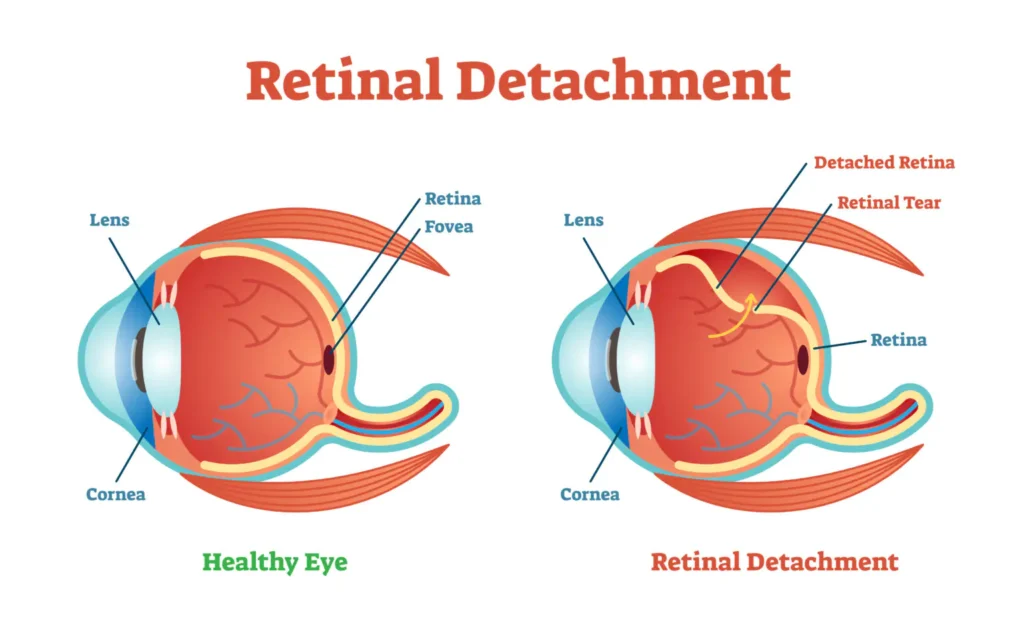
A retinal detachment is a serious eye condition that requires immediate attention to prevent permanent vision loss. When the retina, the light-sensitive layer at the back of your eye, detaches from its normal position, it can lead to significant vision problems.
Dr Soma is a dedicated Midrand ophthalmologist who can provide quality care for retinal detachment.
What is a Retinal Detachment?
A retinal detachment occurs when the retina separates from the layer of blood vessels that supply it with oxygen and nutrients. Without prompt treatment, this can lead to permanent vision loss.
There are three types of retinal detachments:
- Rhegmatogenous Detachment: The most common type caused by a tear or hole in the retina.
- Tractional Detachment: Occurs when scar tissue on the retina’s surface contracts, pulling the retina away from the back of the eye.
- Exudative Detachment: Caused by fluid leaking underneath the retina without any tears or breaks.
What Causes Retinal Detachment?
Understanding the causes of retinal detachment can help you identify and manage risk factors. Common causes include ageing, with the risk increasing significantly after age 50, and previous eye surgeries such as cataract procedures.
People with severe myopia (nearsightedness) are more susceptible to retinal detachment, as are those who have experienced trauma to the eye. Genetics also play a role, making it essential to know your family history.
Other eye conditions like diabetic retinopathy and retinal lattice degeneration (a relatively common condition that affects the retina, especially in nearsighted people) can elevate the risk of retinal detachment.
What Are the Symptoms of a Detached Retina?
Recognising the detached retina symptoms early can be crucial in preventing vision loss. Common symptoms include:
- Sudden Appearance of Floaters: Small, dark shapes floating in your field of vision.
- Flashes of Light: Sudden flashes, especially in the periphery of your vision.
- Blurred Vision: A noticeable decrease in vision sharpness.
- Shadow or Curtain Over Vision: A shadow or curtain-like effect over part of your visual field.
- Sudden Vision Loss: Immediate loss of vision in the affected eye.
How is Retinal Detachment Diagnosed?
If you experience any symptoms associated with retinal detachment or a torn retina, you must seek immediate attention from Dr Soma – an ophthalmologist near you. Diagnosis involves a comprehensive eye exam, which includes dilating your pupils for a detailed examination of your eyes.
Ophthalmoscopy (an examination of the back part of the eye) is used to examine the retina in detail with special instruments, and ultrasound imaging may be performed to view the retina if bleeding or cloudiness is present.
What Are the Treatment Options for Retinal Detachment?
Retinal detachment is a medical emergency; retinal detachment surgery is often required to repair the damage. Treatment options include:
| Procedure | Use | |
|---|---|---|
| Laser Surgery (Photocoagulation) | Laser burns create scars that seal the retina to the back of the eye. | Effective for retinal tears and holes before detachment occurs. |
| Cryopexy (Freezing Treatment) | A freezing probe is used to seal the retina in place. | Often combined with other surgical methods for effective results. |
| Scleral Buckling | A silicone band is placed around the eyes to push the wall against the detached retina. | Effective for larger detachments. |
| Vitrectomy\ | Removing the vitreous gel (gel-like fluid that fills your eye) and replacing it with gas or silicone oil to retract the retina. | Often used for severe detachments. |
What Can You Expect During Recovery?
Post-surgery care is crucial for successful recovery. Here’s what you can expect after retinal detachment surgery:
- Follow-Up Appointments: Regular visits to monitor healing and check for complications.
- Activity Restrictions: Avoid heavy lifting, bending, and other strenuous activities.
- Medication: Use prescribed eye drops to prevent infection and reduce inflammation.
- Vision Improvement: Vision may take several weeks to improve and stabilise.
Comprehensive Care and Support Every Step of the Way
A retinal detachment is a serious condition, but with prompt treatment, you can protect your vision and prevent permanent damage. Dr Soma is a dedicated Midrand ophthalmologist who is here to guide you through the treatment.
If you experience any symptoms of a detached or torn retina, don’t wait—seek immediate attention from an ophthalmologist near me. Your vision is precious, and we’re here to help you maintain it for a brighter, clearer future.